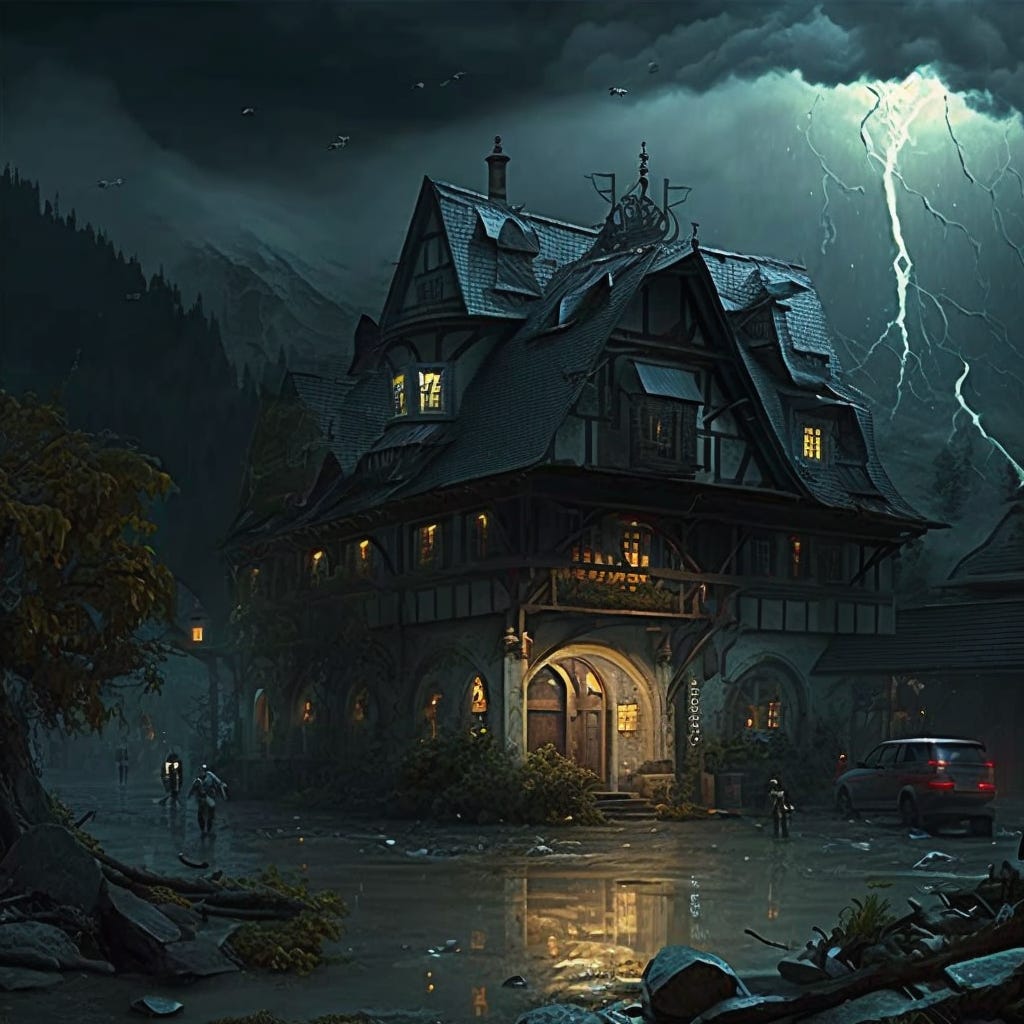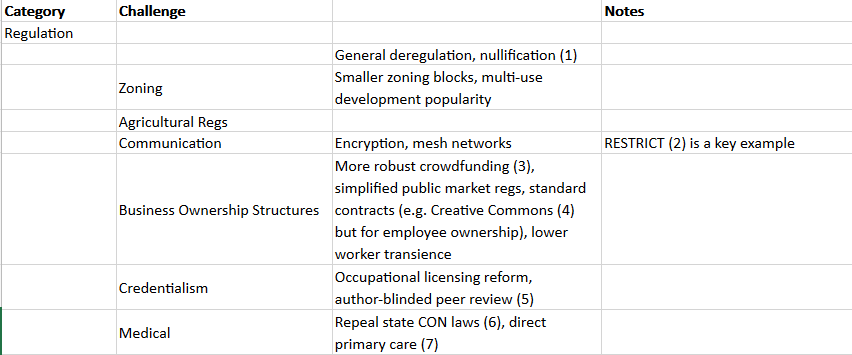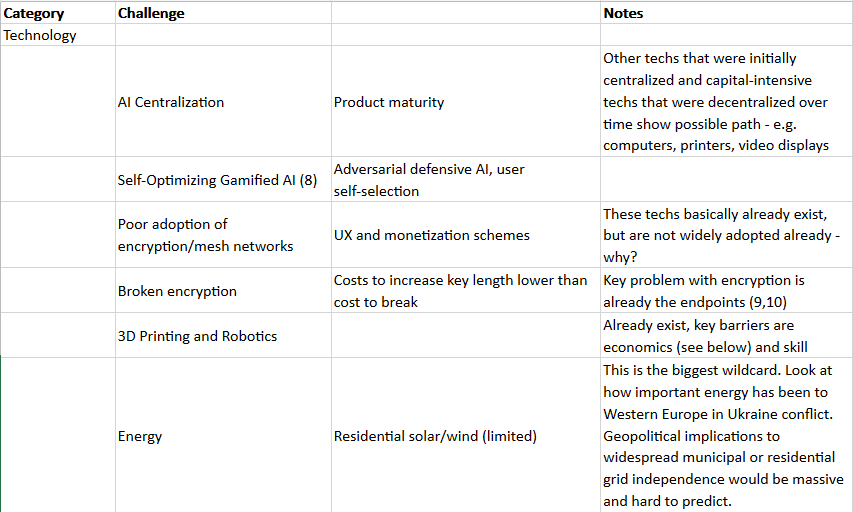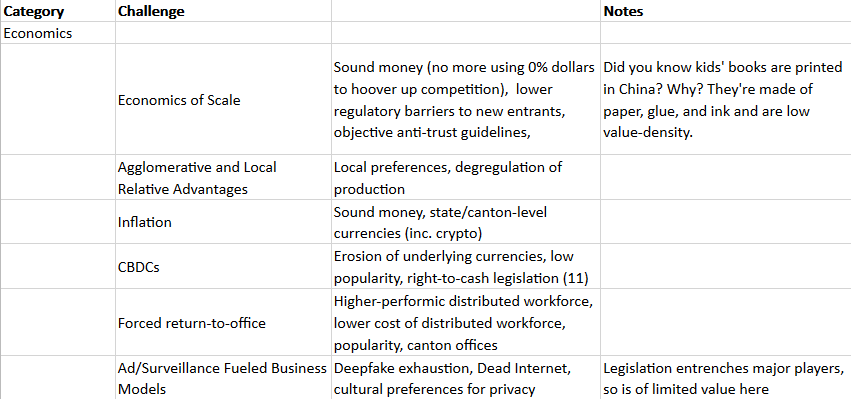My first Substack post (on the Techno-Canton) had a much warmer reception than I ever could have hoped for as a brand-new writer on a brand-new platform. So, while I have some other other ideas to share - thoughts on the culture war, memetic evolution, and maybe some short fiction - my next few posts will develop on the Techno-Canton theme everyone signed up for. There’s a lot that got cut from the first essay to keep it digestible.
Up first: some thoughts on the problems the Techno-Canton will face. John Carter of Postcards from Barsoom noted that the original essay was a bit “pollyannish,” which is true. It was intentional, but I’m not naive. There will be barriers and challenges. If a vision of decentralized, independent communities is worth pursuing at all, it’s worth thinking about what they’ll be.
Here is short essay on two key barriers (centralized power and demand), followed by a list of secondary problems. I had started to write out the full list of problems and some possible solutions, but each line could easily be it’s own essay. I had nearly 10,000 words down and had barely covered the first three lines. Ain’t nobody got time for that.
Fundamentally, the first two matter most anyway. If there is demand for decentralization and independence, there aren’t many secondary problems that are insurmountable. I have some ideas for addressing most of them and there are plenty of other good ideas out there. If there are areas of particular interest or controversy, maybe I’ll write a few challenges up as separate essays later.
Otherwise, here are some things to think about:
Centralized Power
The largest, most immediate challenge to any kind of Techno-Canton project is interference from centralized power structures. No elite group is going to simply acquiesce to the peasants clawing back their privileges.
Indeed, calling it a “challenge” understates the nature of the problem like calling Sauron “a challenge” to the protagonists of the Lord of the Rings. The US Federal Government, the WEF, NATO, the UN, the WHO, et. al are more than “a challenge” to free and independent living. They are what must be nullified in order to achieve victory.
They will not be shy about using any tool in their belts to keep their own privileges. Regulation, corruption, and force will all be on the table. On almost every issue listed below, Centralized Power will be on the other side of the game board. In many places, they are already several steps ahead of us, pushing in the opposite direction.
Their natural foil is now, as ever, the people. Which leads me to ask:
Demand
Do people want this?
I think so. In Economics, “Demand” is defined as a desire for a product PLUS an ability to purchase it.
Desire
If people are given the option to opt out of constant surveillance, scoring, and rationing, I think there will be a desire for it. How big that desire is depends heavily on culture. That’s too big a topic even for a big essay like this. For now, suffice to say that key inputs to culture like media and education are hugely important and would benefit from decentralization. Even without addressing the problems in those areas, the existence of projects like The New Hampshire Free State project, the Texas Nationalist Movement, the Convention of States, the Tenth Amendment Center, and more demonstrate that “Don’t Tread on Me” culture hasn’t completely died off completely (at least in the United States, where I am based).
Of course, Centralized Power is selling the ever-popular “liberty for safety” tradeoff. And they’ve gotten very, VERY good at how they sell it. It will take some slicker packaging than my rambling Substacks for this to make any material difference. If you have ideas on how to advance this, go ahead. I’m in it for the win, not the credit.
Ability
It is the ability piece that will be most impacted by the factors below. Technology is always shifting the balance of power between ruled and ruler. Small shifts can make for big changes over time. In any technological or political case, the best odds will be had where people are able to organize.
Organization will be required to overcome almost any the barriers below. That will, of course, inevitably make any organic organization the target of Centralized Power. Cancel Culture will get worse before it gets better and the Centralized Power has already turned to infiltrating non-state-sponsored online communities and churches.
Assuming members of privacy- and independence-minded organizations can stay employed and out of jail, grassroots and private organizations will be the core of tackling the secondary challenges listed below.
Secondary Challenges
(Anyone know how to natively add tables to a Substack post?)
What did I miss?
Footnotes
Nullification - The Tenth Amendment Center
[A Substack post I can’t currently find about author-blinded peer review*]
Agricultural regulation bit I forgot to footnote in the screenshots
*I’ll get better at saving sources as I keep working on this…









This is a good start to an analysis of the challenges posed by the WEFites. Quite the comprehensive table. I agree that demand is very important ... If enough people want it, and move in that direction, it will be more likely to happen. Which is why the power structure spends so much effort trying to convince everyone to want what they want.
I believe this is the post about games playing you that you were looking for:
https://markbisone.substack.com/p/the-games-that-will-play-you